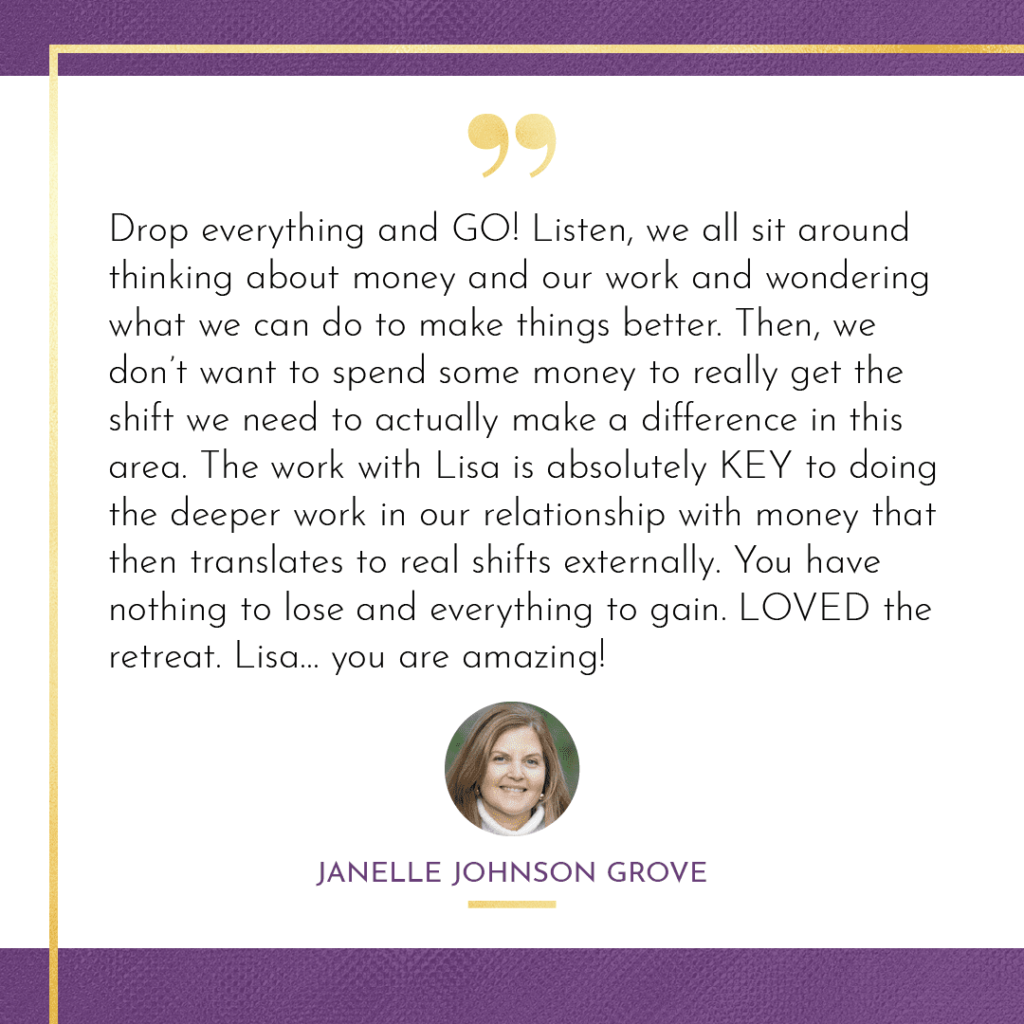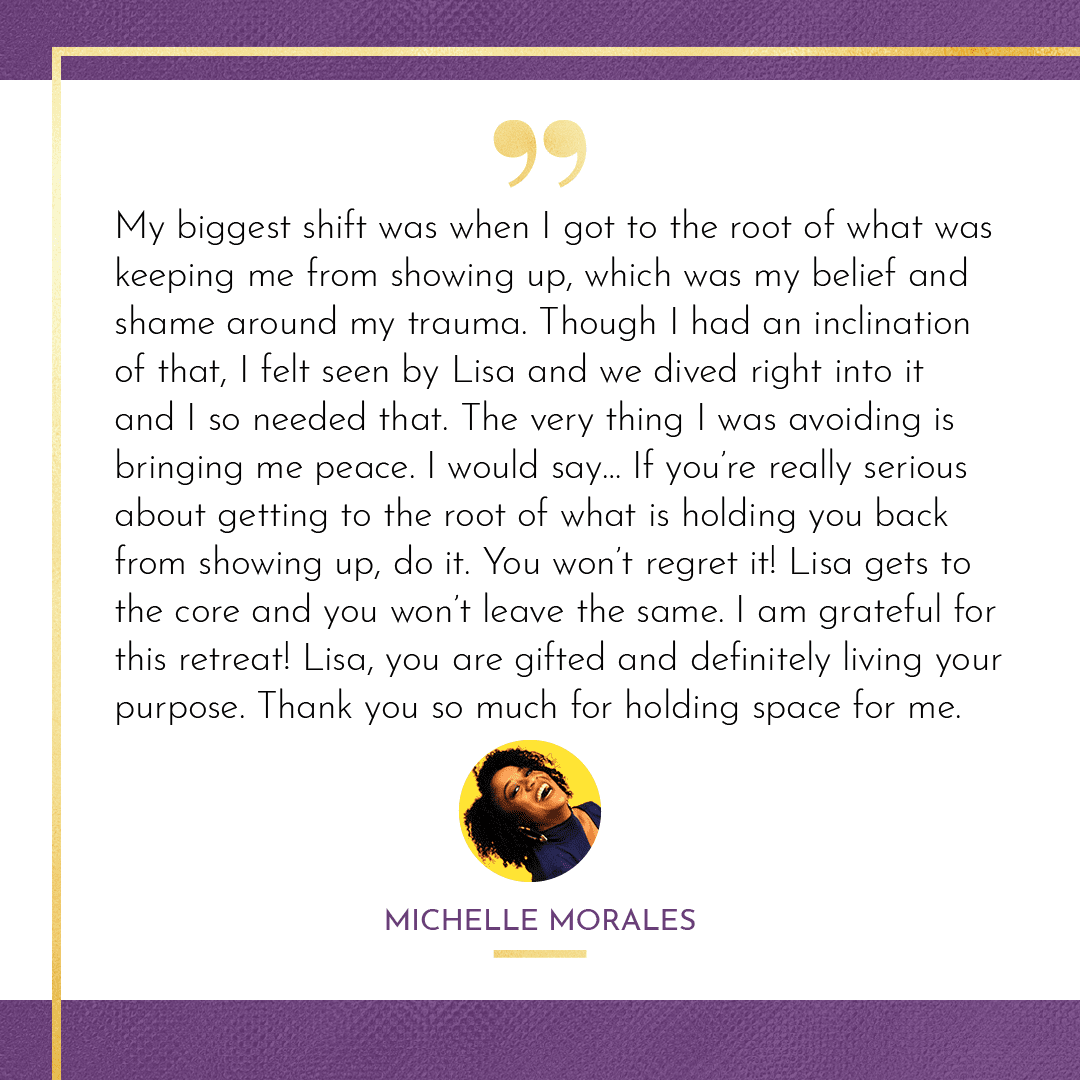lisa fabrega

Some clients at a fabulous cactus garden during a recent retreat I hosted.
Last year, I lost a friend to what I like to call a “boundary boomerang.” When I first met her, I noticed her boundaries first. She used to email me and message me on Facebook, but the one time I replied to her on Facebook instead of email, she set a HARD boundary on only wanting to be contacted via one method of communication.
I was a bit confused. You see, SHE had written ME on Facebook first. It wasn’t like I emailed her there first, I was just replying to where she messaged me. So I wasn’t sure why I was being chastised for not honoring a boundary I didn’t know about.
But I also love boundaries and honoring them in people. And I also know we’re all imperfect, have things we are working through and will have our sore spots. So I decided to extend some grace to her and made note of that sore spot so I could be more mindful of it in the future.
A few months later, she told me she’d had a fight with a friend and the friendship was over. Apparently, her friend had set a boundary with her around the tone of voice she uses to speak to others when she’s mad and asked her not to speak to her that way.
I actually agreed with her friend on some of the points. And I believe in being honest in my relationships, so I told her where I thought she had been wrong and where I thought her friend was right. I also told her very clearly if she ever spoke like that to me, it would be a dealbreaker, so I understood why her friend had reacted how she did. Personally, I just don’t do meanness or condescending/demeaning tones of voice in my relationships. It’s a hard boundary for me.
Fast forward to a few months later and my friend said something I found to be dismissive and a bit hurtful. I told her I felt that way about her words and communicated my boundaries. And she totally went OFF, using the condescending voice with me. She told me I was “being ridiculous.”
This extreme boundary setter had the capacity to set boundaries. But she didn’t have the capacity to be gracious when other people set boundaries with her.
This is one of the rare things you don’t see most people talking about when it comes to boundaries. Everyone tells you to not be afraid to set boundaries. They give you impassioned “ra ra” speeches about having the “right to honor your boundaries.”
And so, you might get worked up enough to become really good at setting those boundaries. You might think “oh, I have no problem setting boundaries now so I don’t think I have a Boundary Capacity issue.”
Think again.
You might be great at setting those boundaries… but what happens when someone sets or holds a boundary with you? Who do you become when you don’t get what you want?
The way you react to other people’s boundaries will tell you a lot about where your Boundary Capacity is TRULY at.
Is it your natural inclination to say, “Thanks, I respect that,” and to TRULY mean it (not just pretend like you mean it)?
- Or is it to get defensive?
- Or keep asking and pushing until you can convince them to do what you want them to do?
- Be filled with shame and embarrassment and beat yourself up?
- Get angry and accuse the other person of being “too rigid?”
- Or make up a story about how they were rude to you so you can avoid looking at the fact that you just didn’t like that they set a boundary with you?
There’s ZERO judgment here. So, be honest with yourself. It’s the greatest Boundary Capacity gift you can give yourself right now.
Because being good at setting boundaries but not being able to respect boundaries without an emotional reaction when they are held/set with you is still a Boundary Capacity issue.
Recently, I heard a brilliant story Oprah told in an interview that highlights this perfectly. She explained when someone says to her, “Hey Oprah, you want to participate in this?” but she doesn’t want to, she’ll say, “No, thanks…”
UP TO TWO TIMES ONLY.
If she has to say it more than two times, she knows now what the person’s intentions truly are.
They have an agenda and don’t actually care about HER and her wellbeing if they won’t listen to her “no.” It makes it plain to her this person wants people to respect their boundaries and desires but doesn’t want to respect others’ boundaries and desires.
Now, take a deep breath and ask yourself these questions honestly:
How many times have you signed a service provider’s agreement, only to then secretly expect extra things from them that weren’t delineated in the contract? And has someone also done that very same thing to you? Those two situations that seem so different… They’re not unrelated.
How many times do you secretly expect your coach to reply to you within your timeframe and not theirs? Or to give you “special discounts” just because you’ve worked with them before? Then get angry at them when they don’t do those things and stick to their boundaries? And has someone done that to you? Again, not unrelated.
How many times have you found yourself thinking someone “doesn’t care” about you if they won’t break their boundary just to give you what you want?
How many times have you pushed a significant other, family member, friend or your kids to do some activity they don’t actually want to do until they give in? How many times did you steer them away from what they wanted to do until they did what you wanted to do?
How many times have you felt yourself react negatively in any way to someone’s boundary, even though they are setting it for their own mental and emotional health reasons?
There are lots of ways I could ask you this question. The ways we expect others to respect our boundaries, but then don’t want to respect theirs are numerous. But deep down you know when/how you are doing this both in your business and life.
And if these things are happening to you, it could be that they’re happening to you because you’re doing the same things to others.
It’s a tough mirror to look at, I get it.
But I’m holding up this mirror because THIS is why you sometimes wonder why you feel drained, overwhelmed, like there’s too much on your plate or like people keep ignoring your boundaries.
It’s not good enough to just be good at setting boundaries if you’re also not good at honoring and respecting boundaries with others (or with your own self). In order to have Boundary Capacity™, you must be good at both.
Otherwise, you’ll constantly burn out and keep getting thrown off your momentum because others keep trying to push and test your boundaries. But the outside world that keeps pushing in on your boundaries is just mirroring to you what you are doing with other people’s boundaries. Get it?
It’s Boundary Karma coming back to bite you in the booty.
I had a client once who constantly complained of clients who didn’t pay her on time, didn’t read the rules on her Facebook groups and had to be banned, and who emailed her all the time, expecting her to write back immediately. When we did a good review of her boundaries, we found she was setting them perfectly.
But then she texted me once and it took me more than four hours to reply because I was on the phone with other clients. (I have a text policy with clients that asks them to give me 48 hours to reply.)
Well, I hung up on my last call of the day to find SEVENTEEN text messages from her, each one progressively angrier and verbally abusive. That’s when I saw clearly why she kept attracting people who did this to her. The world was mirroring back her own behavior.
Needless to say, I fired her as a client. I didn’t want that kind of Boundary Karma, so I did what Oprah would do.
If you notice you often think “I’m so good at boundaries, so why do people constantly try to push up against mine and disrespect them?” then this might be your issue. You can’t say you have Boundary Capacity if you become emotional, defensive, shame-filled or triggered in any way when people hold their boundaries with you.
It’s okay, lots of people do. Society doesn’t teach us about healthy boundaries. So much of our society is built upon a foundation of abuse. And our relationship with boundaries is a lot like our relationship with money — convoluted.
Most of the time when a woman comes to me and says, “I am so exhausted and overwhelmed!” by her career or her business, it’s almost NEVER that her work actually gives her too much to do. And RARELY is it that she “doesn’t have a good calendar hack to make it all work.”
It’s almost ALWAYS that she has a hidden boundary capacity issue. So she says ‘yes’ to things she shouldn’t say yes to, doesn’t even know what boundaries she should be setting, and then gets saturated with too many things to do.
And having too many things to do and not being clear on WHAT boundaries you need is the surest way to keep your career or your business STUCK at the same revenue/income.
That’s why you sometimes wonder, “Why am I working so hard, yet feel like I should have more to show for it?” Boundary Capacity issue.
So now you’re thinking, “What can I do about this? I need to get clear on the boundaries I need for my next level so this DOESN’T happen to me.”
It’s a good thing I opened up my NEW virtual Boundary Capacity retreat for enrollment last week!
In this virtual retreat you can begin the process of expanding your Boundary Capacity, so you can become a champ at not only setting your own next-level boundaries, respecting others’ boundaries AND finally attracting people who have no problem respecting yours.
You’ll leave this virtual retreat with so many core shifts around your relationship with boundaries. You can head here to learn more.
Fair warning: The last six virtual retreats I’ve led have sold out. So you won’t want to wait on this one as I keep each retreat limited to 8 people so I can get enough coaching time with each one of you and go deep!
Here are a few comments from thrilled clients who attended these retreats in the past:


If you’ve felt like your career or business is being held back in any way, it most likely ISN’T a strategy issue. It’s a Boundary Capacity issue.
Come join us and settle this issue once and for all so you can stop attracting boundary pushers.
In love & capacity,



